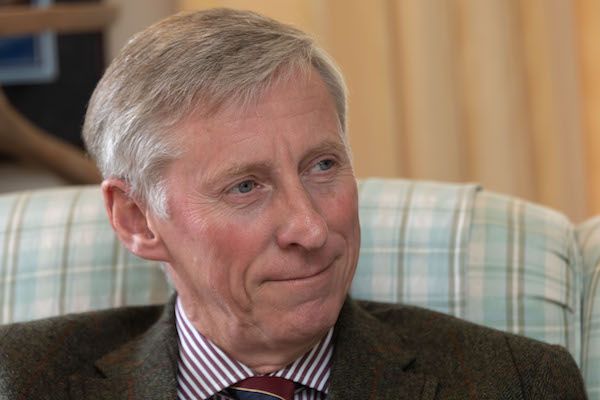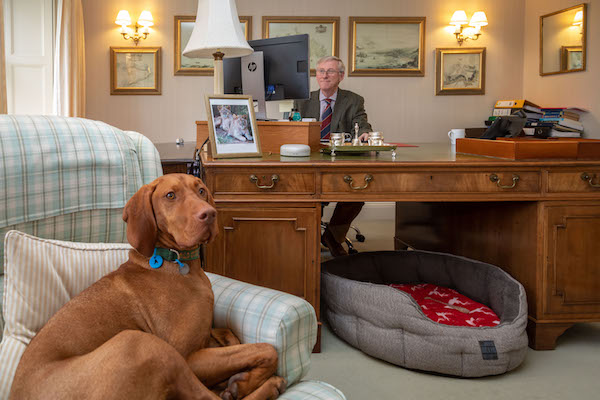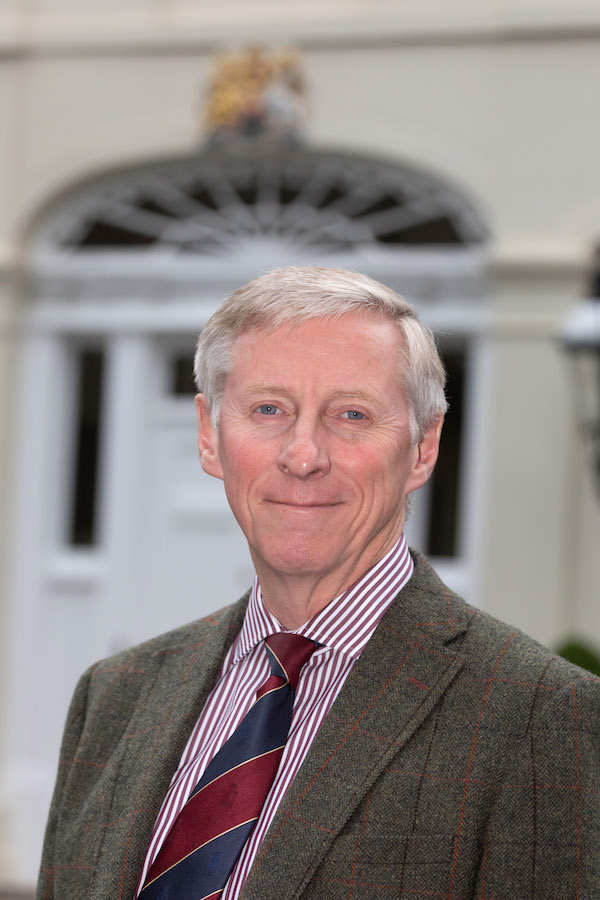

Sir Ian Corder took over the role of Lieutenant Governor of Guernsey nearly three years ago. With a hugely successful naval career behind him, which included tomahawk and trident missile trials, and involvement at various levels with a number of conflicts and naval operational responsibility for major UK events, a life on a small and peaceful island might have seemed a pretty humdrum experience.
But his role in Guernsey has exceeded his expectations. The Bailiwick’s unique culture, its fairly complicated constitution and its active third sector is proving a fascinating backdrop so far, to his five-year tenure. Connect’s Trish Grover met Sir Ian to learn more about his career journey, and his views on the role of Governor.

Pictured: His Excellency, Sir Ian Corder at work at Government House. Images by Chris George.
Although a career in the services was high on his list from an early age, Sir Ian did not come from a particularly ‘military’ family background.
“I come from a pretty ‘normal’ family. My father was from the East End of London and my mother grew up in the Midlands. My father did serve time in the Navy but this was as a result of his national service in the early 50s. He eventually spent 10 years in the Navy and then became a policeman when he came out. No one else in the family had a military background.”
Like many teenage boys, Sir Ian wanted to fly. Then, due to some good PR work by the Royal Navy at the time, it soon took over as a career front-runner.
“There were a couple of programmes on at the time. One was a drama series ‘Warship’ and the second was a documentary on board the old Ark Royal called ‘Sailor’. It was a ‘warts-and-all’ type documentary, which was quite unusual at the time, and I just thought it all looked fantastic fun. So I made enquiries, had the opportunity to spend some time on a frigate through a school friend’s father, and decided to give it a go.”
At this point Sir Ian applied successfully for a schools’ scholarship but at the back of his mind he still wanted to go to university to achieve what he regarded as the intellectual benchmark of reading mathematics at Cambridge. So it was a question of the services sending him there or he was going to re-think his career choice. It wasn’t an issue, and so following his A-levels he spent a short time with the Navy in early 1978 and then went on to Cambridge later that year.
During the three-year degree course, he spent much of his holidays in the Navy and when he achieved a first in mathematics he does admit to having a slight hesitation as to his next steps.
“My more academic leanings started to re-emerge and I considered staying on at Cambridge to do some research. But eventually decided against it. Mathematics is an interesting subject. There are very few seriously good mathematicians in each generation. Yes, I had a ‘first’ but I realised I wasn’t going to be a top mathematician of my generation so I stuck with plan A returned to complete my naval training.”
Sir Ian had a reality check not long after this, when the Falklands conflict broke out.
“I was in training during the Falklands conflict and that was a moment when I realised what I was getting into. Up until that point, the most aggressive recent event had been the cod wars with Iceland. The Falklands was a very formative event for me and I remember very clearly the day that HMS Sheffield was sunk.
“I didn’t go to the Falklands during the conflict but I went shortly after it had ended when I joined my first submarine. It was a pretty defining period and was the first time the Navy had involved in any serious conflict for at least 15 to 20 years.”

Pictured: His Excellency, Sir Ian Corder at Government House. Images by Chris George.
During a career that extends over 35 years, there are inevitably many highlights and particular achievements. But there are a few that particularly stand out.
Taking command of my first submarine - HMS Oracle which was a very old diesel-electric submarine which I took on a transatlantic deployment which was to be her last. She was 30 years old at the time. We had some difficult moments and a number of technical problems when we wondered if we would be able to even attempt the return journey. It was October/November and we came back in filthy weather. These subs have to passage on the surface and there were some really hairy moments when we thought we might not make it!
“When you get alongside after a long trip, the submarine has to undergo certain tests on her generators. The generator basically caught fire and blew up. – so that was a rather ‘skin of teeth’ moment which we had got away with!
“Another memorable experience was commanding my nuclear attack submarine, HMS Splendid. She was the first to be fitted with the tomahawk land attack missile – a long-range missile that can travel up to around 1,000 miles and has pin point accuracy. It was the first UK asset to have that long-range capability. So my two-year command of the boat was essentially about making modifications to the submarine and included six months intense work in Rosyth and then taking ourselves, and in essence the entire Royal Navy, through the training programme. This included the weapon system management, target systems, command and control, then building up to some trials in San Diego when we actually fired it. It all worked perfectly.
“I recall saying at the time that if the Navy was to use a weapons system in anger during our tenure that it would be this one. At the end of the testing period I was moved to a new job working for the First Sea Lord. About a month later the Kosovo conflict started and Splendid fired tomahawks in a battle situation and I wasn’t there!
“But I was at the heart of what was going on in London and it was still my team on board. When your team does something like that even without you, you still feel a huge sense of pride.”
Sir Ian recalls a particularly poignant moment when he visited Argentina with the then Sea Lord Admiral Lord Boyce.
“We had to go to Argentina as part of the rapprochement. We visited the Argentine Navy and then went on to Puerto Belgrano. We laid a wreath at the memorial for the Belgrano that was sunk and it was an incredibly poignant moment for me. That conflict in many ways defined my career and we had gone full circle to the reconciliation.
At a higher level, Sir Ian ran the Trident programme for a period.
“We undertook some test firing. When that one flew I was immensely relieved as that was a £26 million missile and we had been planning for three years.”
He was then Naval Operational Commander during the Libya campaign which he describes as an immense operational challenge and which he managed concurrently whilst being responsible for the naval element of the security for the 2012 London Olympics – an interesting mix.
“Then the time I spent in Brussels was just amazing. We were managing so many conflicts – the Ukraine conflict, Syria, the Arab Spring as well as the Mediterranean migration conflict which is still essentially going on.
So, after several decades of what can only be described as high-octane work and responsibilities what attracted Sir Ian to his somewhat calmer role in the island and how does it stack up?
“I had only been to Guernsey on holiday as a five-year-old and then very briefly on a navigation course in the early 80s. I knew a little of its history but clearly not as much as I know now. The idea of having an overview of all aspects of a community - constitutional through to civic operations - was a really fascinating prospect. And on a personal front, Kathryn and I also both relished the thought of being able to do something together.
“The role has been even more than I anticipated. From a constitutional perspective, even though the Bailiwick small, it’s quite complicated. You have three almost independent jurisdictions with the dynamics and inter-relationships that go with that. Then in Guernsey, there are the mechanisms of a fully functioning government, albeit on a small scale. But all the elements are there and being involved with their interaction, I find absolutely fascinating.”
Unsurprisingly, community activities take up a large proportion of Sir Ian and Lady Corder’s time. This includes visits to schools, retirement homes, work with associations, as well as involvement with local charities (including around 70 of which they are patron).
He also spends around 20% of his time on constitutional matters - sitting in the States in Guernsey and Alderney, and the Chief Pleas in Sark.
“Acting as the ‘gateway’ to the British government for the smaller islands in particular and being aware of the particular pressures they are under probably takes more time than I had anticipated. The rest of my time is spent on more executive work. For example if there is a deportation case, I am the decision-maker.”
Sir Ian believes that the five-year tenure is about the right length of time for a Governor to be in post.
“It certainly shouldn’t be any shorter. It takes a while to understand the subtle nuances and how a place works. It might be a little longer but it’s always good to have fresh ideas. For example I was keen to create a slightly more modern face to what we do. So we now have a website and a twitter feed and we have modernised the way that we do business a little. It’s a question of trying to create something that balances the traditional aspect which is the constitutional heart of the Bailiwick, but equally being in touch with what’s happening in the Bailiwick and in the rest of the world.”
And Sir Ian has a couple of tips for any future governors.
“The biggest piece of advice is take your time to work your way into the Bailiwick. Take time to understand the history, the unique culture and get out and meet the people. There are some fantastic people here. The more time you spend ‘walking the beat’, as the police would say, the better.”
This article appeared in Connect which can be read online here or picked up free from local outlets.
Pictured top: His Excellency, Sir Ian Corder. Images by Chris George.
Comments
Comments on this story express the views of the commentator only, not Bailiwick Publishing. We are unable to guarantee the accuracy of any of those comments.